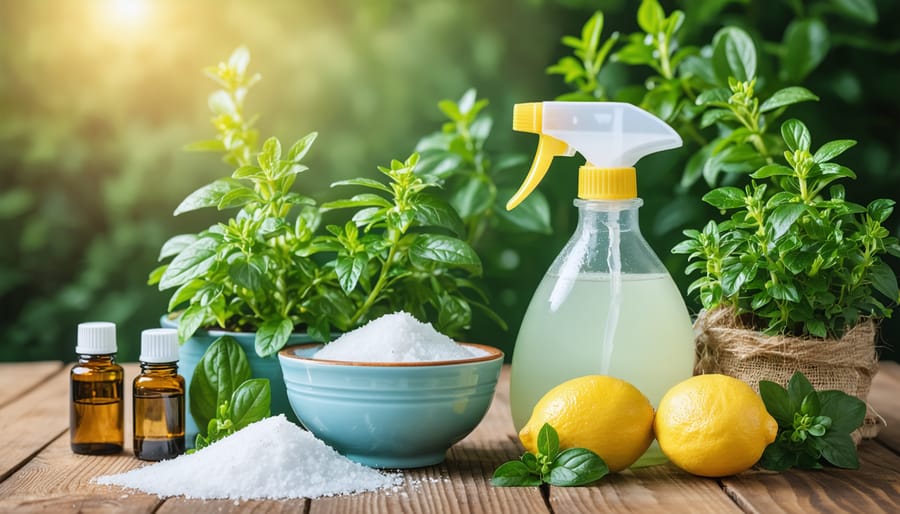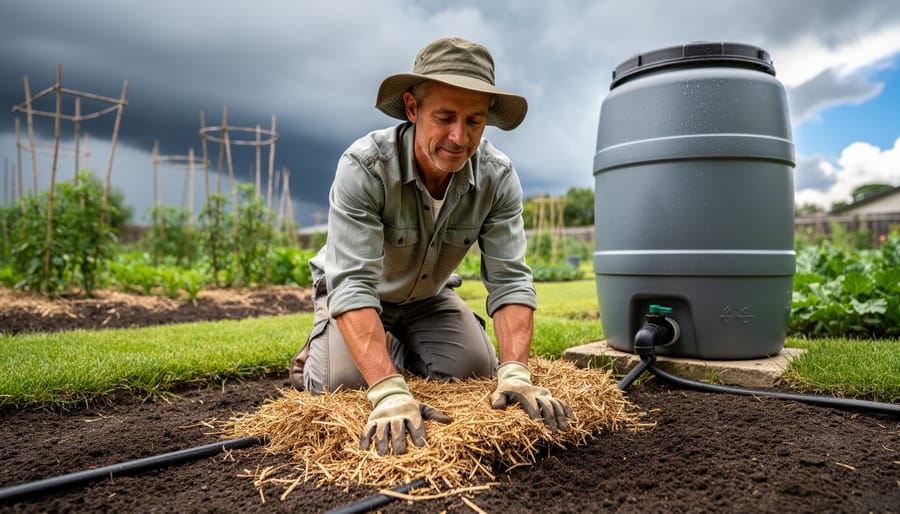Transform your garden care routine by choosing a supplier of quality Cleaning products that nurture rather than harm your precious plants. Natural vinegar solutions, baking soda pastes, and enzyme-based cleaners provide powerful alternatives to harsh chemicals, protecting both your indoor and outdoor growing spaces. While traditional cleaners can leach toxic compounds into soil and damage beneficial microorganisms, garden-friendly options actually enrich your growing environment.
Think beyond the cleaning aisle – many of the gentlest and most effective solutions for maintaining a clean, garden-safe home already live in your kitchen cabinets. From citrus-based degreasers to essential oil sprays, nature offers a complete toolkit for keeping your space pristine without compromising your plants’ health. By making thoughtful choices about the products we use around our gardens, we create a harmonious environment where both cleaning and growing can flourish together.
Why Commercial Cleaners Can Harm Your Garden

Common Toxic Ingredients to Avoid
When creating a garden-friendly cleaning routine, it’s crucial to understand which ingredients can harm your plants and soil. Many conventional cleaning products contain chemicals that can disrupt the delicate balance of your garden ecosystem, similar to how harsh chemicals affect eco-friendly pest control alternatives.
Watch out for sodium hypochlorite (bleach), which can sterilize soil and harm beneficial microorganisms. Ammonia-based cleaners are particularly dangerous, as they can burn plant roots and leave toxic residues in your garden beds. Phosphates, commonly found in dishwashing detergents, can cause excessive algae growth when they leach into garden soil.
Avoid products containing phthalates, often listed as “fragrance” on labels, as these chemicals can accumulate in soil and affect plant growth. Triclosan, an antibacterial agent, is another concern because it can harm the good bacteria your plants need to thrive.
Look out for parabens, synthetic surfactants (like SLS), and formaldehyde-releasing preservatives. These ingredients not only pose risks to your garden but can also affect beneficial insects and pollinators that visit your plants.
How These Chemicals Affect Your Garden
Common household cleaning chemicals can have far-reaching effects on your garden’s ecosystem. When these products seep into the soil, they can alter its pH balance, making it difficult for plants to absorb essential nutrients. Even small amounts of bleach or ammonia-based cleaners can harm beneficial microorganisms that help break down organic matter and support healthy root systems.
Your garden’s helpful insects are particularly vulnerable to chemical exposure. Products containing synthetic surfactants can damage the waxy coating on earthworms’ bodies, reducing their population and affecting soil aeration. Beneficial pollinators like bees and butterflies may avoid treated areas, potentially impacting your garden’s productivity.
Chemical runoff can also affect your plants directly. Many cleaning agents contain high levels of sodium and chlorine, which can burn tender leaves and root systems. Over time, these substances can accumulate in the soil, creating an inhospitable environment for new growth and potentially stunting existing plants.
The impact isn’t limited to your current growing season. Some chemicals can persist in the soil for months or even years, gradually breaking down the soil structure and reducing its ability to retain water and nutrients. This is especially concerning for vegetable gardens, where food safety becomes an additional consideration.
Fortunately, by choosing garden-friendly cleaning alternatives, you can maintain both a clean home and a thriving garden ecosystem. Natural cleaning solutions work in harmony with your garden’s natural processes rather than against them.
Garden-Safe Commercial Cleaning Alternatives
Certified Eco-Friendly Brands
Several trusted brands have made significant strides in creating garden-safe cleaning products that won’t harm your precious plants. Dr. Bronner’s leads the pack with their Pure-Castile Soap line, which uses organic oils and is completely biodegradable. Their products are versatile enough for both indoor cleaning and gentle plant care.
Seventh Generation has earned recognition for their plant-based cleaning solutions, particularly their all-purpose cleaners and dish soaps, which break down naturally without leaving harmful residues in your garden soil. Ecover’s garden-friendly products feature renewable plant-based ingredients and are certified by environmental organizations for their low impact on ecosystems.
For those focusing specifically on outdoor cleaning, BioKleen’s natural enzyme cleaners are excellent for cleaning garden tools and equipment without risking damage to nearby plants. Method’s biodegradable solutions, especially their naturally derived glass and surface cleaners, have gained popularity among gardeners for their effectiveness and eco-consciousness.
These brands consistently receive high marks from both environmental certification bodies and gardening communities, making them reliable choices for maintaining a clean space while protecting your garden’s ecosystem.

What to Look for on Labels
When shopping for cleaning supplies that align with garden-safe cleaning practices, the key is knowing what to look for – and what to avoid. Start by checking for biodegradable certifications and phrases like “environmentally friendly” or “eco-safe.” However, don’t stop there, as these terms aren’t always regulated.
Look specifically for products labeled “phosphate-free” and “chlorine-free,” as these chemicals can harm beneficial soil microorganisms. Scan the ingredients list for plant-based surfactants and natural enzymes instead of harsh synthetic chemicals. Products containing vinegar, citric acid, or plant-derived cleaning agents are typically garden-friendly choices.
Be wary of labels that include words like “antibacterial,” “antimicrobial,” or “disinfectant” – these often contain chemicals that can disrupt your garden’s natural balance. Also, avoid products with warnings about pet or plant safety, as these are clear red flags.
The pH level, if listed, should be between 6 and 8, which is generally safe for most garden soils. Remember, fewer ingredients usually means better for your garden, and if you can’t pronounce an ingredient, it might be worth researching before use.
Natural DIY Cleaning Solutions
Basic Ingredients for Safe Cleaning
Creating effective and garden-safe cleaning solutions starts with a handful of simple, natural ingredients you probably already have at home. White vinegar leads the pack as a versatile cleaner, effectively breaking down dirt while being completely safe for your garden soil. Baking soda serves as a gentle yet powerful scrubbing agent, perfect for tough stains without harmful residues. Lemon juice adds natural antibacterial properties and a fresh scent, while castile soap provides an excellent base for natural DIY solutions. Essential oils like tea tree, lavender, and eucalyptus not only add pleasant aromas but also bring their own cleaning properties. These ingredients can be combined in various ways to create effective cleaners that won’t harm your precious plants or beneficial garden insects.

Simple Cleaning Recipes
Here are three simple cleaning recipes that are both effective and garden-friendly:
All-Purpose Cleaner
– Mix 2 cups of white vinegar with 2 cups of water
– Add 20 drops of lemon essential oil
– Pour into a spray bottle
– Shake well before each use
Glass and Mirror Cleaner
– Combine 1 cup of water with 1 cup of white vinegar
– Add 2 tablespoons of cornstarch
– Mix in a spray bottle until cornstarch dissolves
– Use with a microfiber cloth for streak-free results
Natural Scrub
– Mix ½ cup of baking soda with ¼ cup of liquid castile soap
– Add 10 drops of tea tree oil
– Stir until it forms a paste
– Store in an airtight container
These solutions are gentle enough to use around your garden but tough enough to tackle everyday dirt and grime. The ingredients are readily available and safe for both indoor and outdoor use. Remember to label your containers clearly and keep them out of direct sunlight. For best results, make small batches and use within a month.
Pro tip: When cleaning outdoor spaces near plants, spray your cleaning solution directly onto your cloth rather than the surface to prevent overspray on your garden.
By choosing garden-friendly cleaning supplies, you’re not just maintaining a clean home – you’re protecting your precious plants and the environment. Remember to always check product labels, opt for natural ingredients like vinegar and baking soda, and consider making your own cleaning solutions when possible. The extra effort to select eco-conscious cleaning products pays off in healthier soil, thriving plants, and a safer environment for beneficial insects and wildlife. Every small change in your cleaning routine makes a difference, from switching to biodegradable soaps to using natural scrubbers. Let’s work together to keep our gardens flourishing while maintaining clean, healthy spaces. Your garden will thank you for making these mindful choices, and future generations will benefit from your commitment to sustainable cleaning practices.




